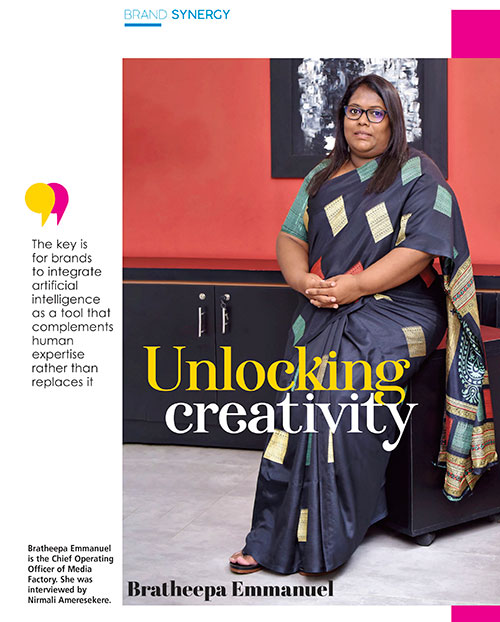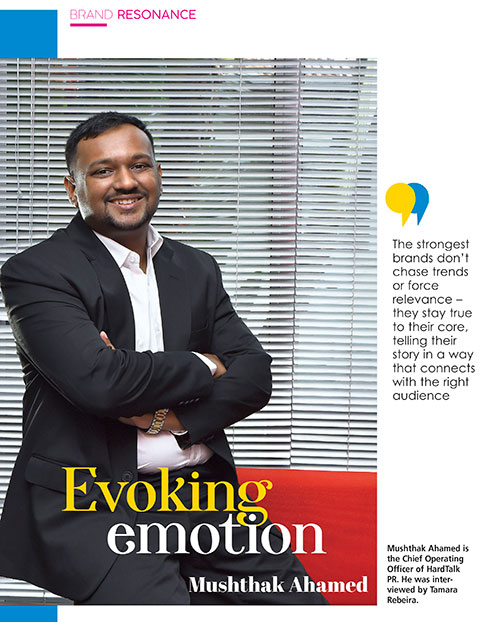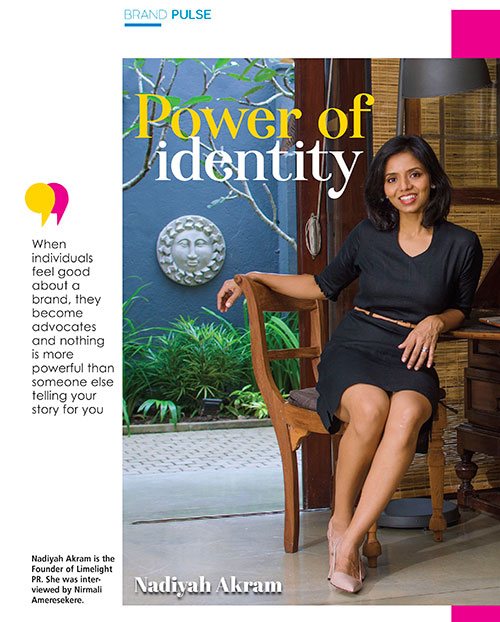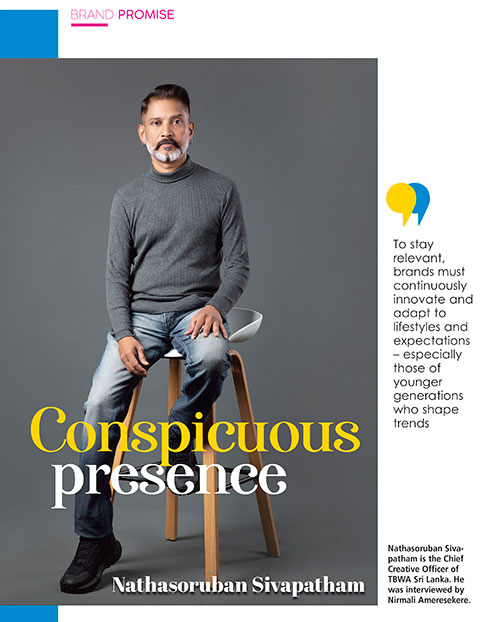NATION BRANDING
MADE IN SRI LANKA
Yamini Sequeira hopes that ‘Made in Sri Lanka’ will soon be transformed into a mark of integrity and innovation
In an increasingly competitive global marketplace, branding has emerged as a critical differentiator for businesses. Regardless of whether they are established or emerging brands, effective branding is about crafting a compelling identity that resonates with customers, builds trust and opens doors to new markets.
Branding serves as the bridge between a business and its customers; it encapsulates the values, promises and experiences that a business offers.
Ceylon Tea has become synonymous with quality and flavour, representing Sri Lanka’s rich tea heritage. Brands such as Dilmah have elevated global perceptions by emphasising ethical sourcing and sustainability.
Sri Lanka’s gem and jewellery industry is renowned for its exquisite craftsmanship and high quality gemstones. Participation in international trade fairs and promoting the unique qualities of Sri Lankan gems has helped local jewellers gain recognition in world markets.
Meanwhile, Sri Lanka’s spices such as Ceylon Cinnamon, which are known for their rich flavours and aromatic qualities, have found favour in international markets. Sri Lankan brands have successfully marketed local spices by emphasising their authenticity and traditional processing methods.
The apparel industry has earned a reputation for high quality manufacturing and ethical labour practices. With over four decades of experience, Sri Lanka manufactures apparel for prestigious international brands including Victoria’s Secret, GAP and Nike.
Described as the ‘most family friendly tourist destination for 2025’ by Condé Nast Traveller, Sri Lanka’s tourism industry is currently witnessing a boom. The proliferation of travel vlogs across social media is spreading the destination’s charm far and wide, one reel at a time.
Needless to say, while there is no formal branding strategy for our tourism product, there’s a strong association with the island’s potential to attract travellers – a branding opportunity that must not be missed this time round.
CHALLENGES Branding remains a strategic imperative for Sri Lankan businesses that are seeking to compete globally. Though the benefits are clear, SMEs often lack the financial and human resources to invest in comprehensive branding strategies as they operate within restricted budgets.
And therefore, efficient branding (strategy, design, marketing and customer engagement) often takes a backseat in operational priorities.
Furthermore, changing longstanding perceptions about Sri Lankan products can be difficult, especially in markets where competitors have established strong brands.
Despite these challenges, opportunities abound…
The advent of digital marketing offers cost-effective channels for brand promotion and helps businesses reach global audiences. Sri Lankan products such as spices and handicrafts have unique qualities that can appeal to niche markets that seek authentic and high quality goods.
But fragmented market perception persists.
Despite possessing world-class products, Sri Lanka’s nation brand hasn’t been sufficiently leveraged. International consumers often recognise the products but not the country of manufacture.
This disconnect weakens the nation’s brand equity.
For a brand to build trust, consistency across platforms and markets is critical. Many local brands struggle to maintain cohesive messaging across packaging, digital channels and international markets due to a lack of expertise or guidance.
A practice of imitation over innovation prevails. Some local products lack distinct brand identities and often mimic foreign labels or fail to communicate a compelling local story, which undermines their competitiveness and potential to differentiate.
While many businesses export bulk commodities, few focus on building branded products abroad. As a result, value addition remains low with Sri Lanka missing out on making inroads into premium markets.
OPPORTUNITIES E-commerce and social media have levelled the playing field for brands. Sri Lankan businesses can now reach global audiences without expensive intermediaries, provided they invest in digital branding and storytelling.
There’s been a rise in demand for authentic and ethical products. Global consumers are increasingly valuing sustainability, transparency and authenticity. So Sri Lanka’s natural ingredients, artisanal skills and ethical sourcing can be powerful differentiators in the right branding framework.
Regional integration and FTAs can also be useful.
Expanding trade relationships with India, China and ASEAN can provide entry points for branded local goods. Branding can help businesses move up the value chain in these high growth markets.
Unfortunately, Sri Lanka’s diaspora remains an underutilised asset.
These communities can be our brand ambassadors, early adopters and distribution partners – particularly for heritage rich categories such as food, fashion and wellness.
PERSONAL BRANDS In today’s interconnected world, personal branding has become increasingly important.
A strong personal brand can establish authority, attract opportunities and enhance business branding. The adoption of social media and the influencer culture have accelerated this trend in recent years.
Since the line between professional identity and personal image is becoming increasingly blurred, personal branding (i.e. the practice of marketing yourself and your career as a brand) has become a powerful tool not only for individual growth but also to amplify business success.
When a business leader is perceived as being knowledgeable, transparent and authentic, that trust spills over to the enterprise as well. Customers, partners and investors are more likely to engage with a company that’s led by someone they know and respect.
In essence, people connect with people more easily than with corporations.
A compelling personal brand can help you cut through the noise and draw attention to your business. Whether through social media, interviews, speaking engagements or thought leadership articles, your presence becomes a magnet for awareness and interest.
Finally, top talent is drawn to companies with inspiring leaders. By building your personal brand around your values, leadership style and mission, you naturally attract professionals who share your vision.
In times of crisis or change, a strong personal brand can provide reassurance and continuity for customers and stakeholders. While companies may pivot, merge or even close, a strong personal brand endures.
When this is done with foresight, it becomes a powerful multiplier that enhances your influence, amplifies your company’s reach, and builds lasting impact in both the business world and beyond.
THE FUTURE The future of branding in Sri Lanka lies in moving from product led to purpose driven strategies.
As global consumers become more conscious of sustainability, ethical sourcing and authenticity, Sri Lankan businesses must align their brand identities with these values.
This calls for telling compelling stories of heritage, craftsmanship, community empowerment and environmental responsibility – rather than simply selling products. Industries and sectors such as tea, spices, apparel and wellness are well-positioned to leverage these narratives, and turn ‘Made in Sri Lanka’ into a mark of integrity and innovation.
As Sri Lanka invests in ICT infrastructure, trade facilitation and upskilling, the branding ecosystem will become more robust.
Government and private sector collaboration will be crucial to helping local brands expand internationally, build brand equity and command value in world markets. For instance, Port City Colombo could be a game changer and help brand Sri Lanka as a nation on the move.
In a world shaped by shifting trade dynamics such as President Donald Trump’s tariff policies and growing protectionist sentiments, branding offers a buffer against volatility and trade shocks.
Moving beyond commodity trading into value added branded products is essential for exporters to help them weather such shocks. A compelling brand story that’s built on trust and perceived value can help justify premium pricing even when tariffs make goods more expensive – branding is a strategic asset, after all.








